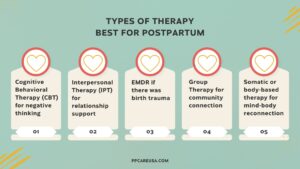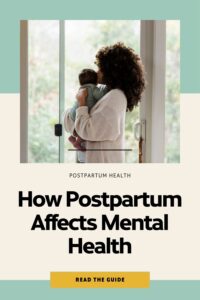Recovery postpartum isn’t just about physically healing—it’s about emotionally healing, too. Becoming a new mom is a huge shift not only in your day-to-day routine, but in your identity as a human being. The reality is, many moms struggle with their mental health and if that’s you, therapy postpartum may be your next step.
We believe that taking care of mom is how you protect your family’s future. Mental health postpartum challenges are common, and one of the best things you can do for yourself is find support through therapy.
In this post, we’ll explore how therapy for postpartum moms can support depression, anxiety, and emotional recovery after having a baby. We’ll bust the myth that therapy is only for crisis and dive into how it can be used as a long-term support tool.
How Does Postpartum Affect Mental Health?
The postpartum period for new moms consists of intense hormonal shifts, identity changes, and emotional overload that can affect even high-functioning women. It’s no wonder this time can have a strong impact on mental health!
You may experience common issues like:
- Postpartum depression
- Postpartum anxiety
- Feelings of rage, detachment, guilt, or overwhelm
Unfortunately, you may be told that these feelings are completely normal after having a baby. Maternal mental health struggles are just a “regular part of postpartum”. You deserve better than that—and your family does, too. Taking care of your mental health postpartum isn’t indulgent or a “nice to have”; it’s essential for your recovery.
When to Consider Therapy as a New Mom
Seeing a therapist for new moms can be a life-changing step towards healing. Think of a therapist as another member of your care team. You might see a postpartum dietician, lactation consultant, pelvic floor therapist, or a virtual postpartum clinic, and a therapist is another expert to help you manage things like postpartum depression and anxiety.
While you can start seeing a therapist at any time postpartum, here are some real-life scenarios that may inspire you to start your therapy journey:
- Feeling numb or sad weeks after giving birth
- Constant worry about the baby’s health or safety
- Panic attacks or intrusive thoughts
- Anger or frustration that feels out of control
- Difficulty bonding with your baby
Therapy is your safe space to unpack these feelings, get to the root cause, and explore coping mechanisms that work best for you and your family.
What Type of Therapy Is Best for Postpartum?
There are many different types of therapy to support you postpartum. Here are a few common modalities and how they may be best utilized for new moms.
Cognitive Behavioral Therapy (CBT)
CBT is one of the most common types of therapy. The core principle of CBT is that the way someone thinks and feels affects how they behave. If you find yourself having negative thinking patterns, this may be the right fit for you.
Interpersonal Therapy (IPT)
IPT is an evidence-based approach to treating mood disorders, with the main goal of improving relationships and social functioning. If you’re struggling to maintain a positive relationship with your partner, children, or friends after having a baby, you might find IPT supportive.
EMDR
EMDR involves recalling a traumatic event while following side-to-side eye movements, guided by your therapist. If you experienced a traumatic birth experience, this is a modality you may want to consider.
Group Therapy or Support Groups
Sometimes all you need to feel better is to know you’re not alone in your struggles. Group therapy or support groups is a powerful way to find healing through community connection and conversations with fellow moms.
Somatic or Body-based Therapy
Somatic therapy connects your mind and body by combining talk therapy and physical techniques to release tension negatively affecting your physical and emotional wellbeing. If you find yourself feeling lost in your thoughts and disconnected from your body, this may be the type of therapy best for you. (Source)

Finding the Right Therapist for New Moms
Remember that choosing a therapist may take time. It’s okay to book a session with someone and move on if they don’t feel like the right fit for you. We recommend finding a therapist who specializes in perinatal or maternal mental health and is trained in postpartum-specific care.
How to Help Maternal Mental Health (for Loved Ones)
If you have a loved one struggling with their mental health after having a baby, know that your support and care makes a massive difference. Here are some tips for partners, friends, and family to help maternal mental health improve.
Normalize her experience.
Whether she feels overwhelmed by her invisible mental load, struggles with postpartum anxiety and rage, or feels like she’s on a hormonal rollercoaster, normalize and validate her experience. Make her feel understood, even if it’s just offering her a listening ear.
Offer practical help without judgment.
Take steps to reduce the mental load of a new mom by cooking some freezer-friendly meals, folding the laundry, or cleaning up around the house. Sometimes it’s better to give a new mom options or just choose how you’re pitching in instead of asking, “What can I do?”.
Encourage professional support.
While the love and support from a partner, family, and friends makes a world of difference for a new mom, professional support like meeting with a therapist is a helpful suggestion for a woman going through postpartum.
Respect her privacy and feelings.
Remember not to take it personally if she chooses to keep some of her thoughts and feelings to herself. The postpartum period is an adjustment for everyone in the family, so give her space with the reminder that you’re there for her.
Therapy Postpartum as a Long-term Support Tool
Therapy isn’t just a last resort when you’re experiencing a breakdown moment—it’s a proactive, empowering way to care for yourself and grow as a new mom. It won’t only help you navigate the postpartum season; it will build a foundation for you to be a better mother in the future.
Therapy postpartum is a long-term support tool, not just a short-term quick fix. The lessons you’ll learn about yourself as a person, inside and outside of motherhood, will help you navigate challenges and situations that inevitably will arise in the future.
Some new moms attend therapy only for a few months, until they feel like they have a better handle on life as a mother. Other moms stay for years!
No matter your approach to therapy, it can help you improve your relationships, boost self-confidence, and find joy in motherhood.
You Deserve to Be Supported
Motherhood doesn’t need to be lonely, and you deserve to feel supported. Therapy is a tool to help you show up for yourself the way you show up for everyone else in your life. It’s not a last resort—it’s a transformational first step.
If you’re a new mom ready to take the next step in your mental health journey, we invite you to:
- Explore therapist options. Psychology Today is a great website to search for available therapists in your area who accept your insurance and specialize in your desired areas.
- Talk to a postpartum specialist. Reach out to us today if you’re experiencing things like postpartum depression and anxiety, and we’ll help you get to the root cause so you can heal.
Pin This for Later:



Postnatal Depletion
Meet the Team
Our Services
Supplements
A virtual healthcare clinic that helps postpartum mamas recover from postnatal depletion syndrome with a holistic approach.

Get in touch